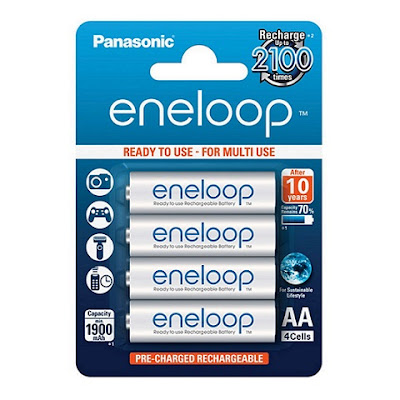Ready to use out the pack Panasonic Eneloop NiMH Batteries (Both AA and AAA) have been around for a while now. They are considered by many to be the best rechargeable batteries you can buy. From the standard (classic) Eneloops packing an extremely long shelf life, to the PRO Eneloop being especially suited to high-drain electrical devices, Panasonic Eneloop certainly tick a lot of boxes when it comes to a good rechargeable battery.
I agree, they are the best. With Duracell and Energizer coming in at second and third. The standard Eneloops can be recharged up to 2100 times, while the PRO Eneloop (2500mAh) can manage a normal in comparison 500 recharges. That's still very good considering the high mAh, low self discharge and suitability for high drain devices.
So, what's the problem with them?
In terms of packaging and battery labelling (wrapping), there's not that much difference. And if viewing small pictures on a sales listing with low quality pictures, it certainly makes it more difficult to be able to spot online before actually committing to buy them and opening the packaging to test / charge the batteries.
Besides, people just grab pictures from the Internet anyway and post them in their listing. So you may think you are buying some genuine Eneloop from the picture, but what you receive may look a bit different from the image used on the listing.
How to tell the fakes
Dates should be stamped / pressed into the battery wrapper / labelling. Furthermore, sizing can also be slightly different. And the batteries can have many more subtle signs that show their fake-ness. This is by no means an exhaustive run-down, but really just a quick list of common things to look out for.
If you want more information on what to look out for you can find more here and here. So that, is the issue. It is getting harder to find genuine Eneloops.
And due to the fact that they cost around double the price of your average Duracell or Energizer comparisons (2000mAh+), it can make it a costly road to go down when trying to source and buy genuine Panasonic Eneloops online. Shame really, because they are the best rechargeable batteries.
I see some websites telling people not to buy Eneloops on eBay, but then they recommend buying them from Amazon. But this is flawed advice in my opinion, and I'll tell you why. First off, these days most people selling on eBay are also selling on Amazon. To add to the problem, the way Amazon is set up makes it very possible for the companies selling fakes to sell their useless fraudulent batteries on an Amazon listing that previously sold genuine Eneloops.
That's because when a seller runs out of stock, either Amazon themselves (if they have their own Eneloops in stock) or a new seller (potentially selling fakes) takes the place of the previous seller and gets to sell their stock to fill the demand if they have stock stored at an Amazon warehouse.
This is known as Fulfilment By Amazon (FBA). Or, I believe, even if they don't have stock stored at an Amazon Warehouse they can still use the "sell yours here" option or still be put into position as the main seller. That is when you see either sold by Amazon, or, in a quick example: "Dispatched from and sold by 7dayshop Limited" (which is a current seller of this product on Amazon UK).
This selling strategy can and does eventually destroy the reputation of the listing and Eneloop batteries themselves. Bottom line: It may not be as bad as eBay, but its not that hard to sell fakes on Amazon. And sellers do so regularly. This is also confirmed from some reviews I have read, where the customers were really disappointed with their "Eneloop" batteries.
Stating that they just don't hold a charge whatsoever. And this feedback was on listings where the previous reviews were excellent. Take from that what you will. Could it be down to a fault or quality control issue with original Eneloops, or someone who sells fakes got put in the selling spot.
I know which one of these scenarios I would go with. One of the key questions is how well do Amazon check their stock received from sellers (FBA) for being fake, and if sold by Amazon themselves, is that stock confirmed as genuine.
Of course, Eneloops, specifically the PRO versions, can be quite fragile in terms of what charger they are used in (best to buy them as a bundle kit that comes complete with an Eneloop specific charger), what device they are used to power, etc. So could some bad reviews be down to buyers not being aware of how delicate the PRO versions can be.
I'd have to say yes. But not all the bad feedback is down to that, as there are similar reviews on the standard 1900mAH Eneloops, which are much more compatible overall, so I would say occasional bad batches and fake batteries are the culprits.
With fake batteries being the most predominant. All you can do is educate yourself on how to tell real from fake, which of course not only includes the information provided here and at the useful links above, but also checking the reviews and company reputation of the sellers.
However, the real proof is in the product. The genuine article still dominates most marketplaces overall. If you do some or all of the checks, are satisfied to proceed with the purchase and end up buying some genuine Panasonic Eneloop, they should perform really well and last many years. If they don't, there's a good chance they are not real Eneloop.








